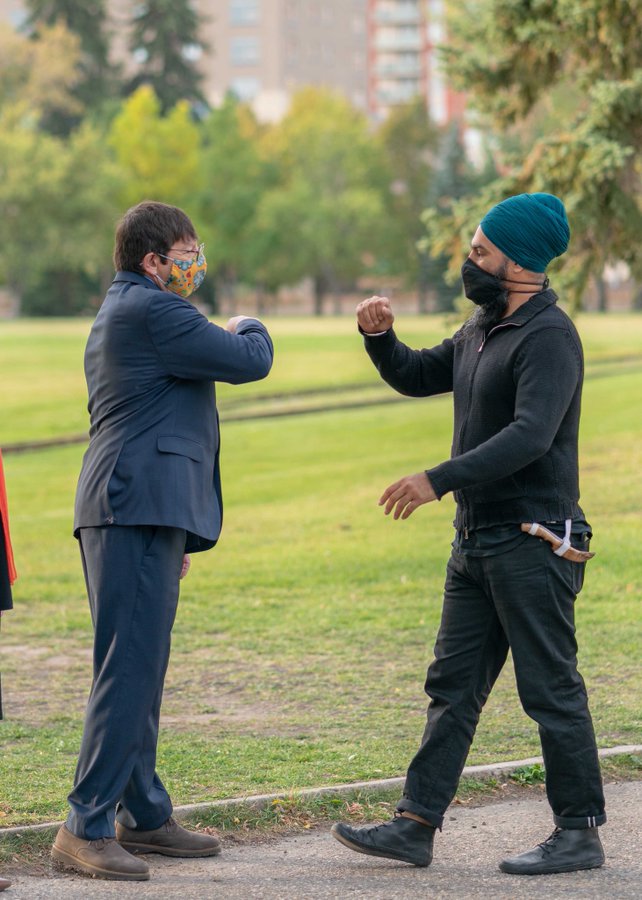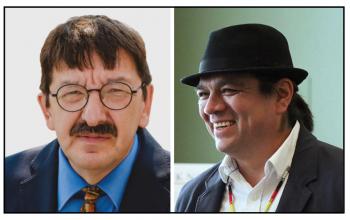Image Caption
Summary
Local Journalism Initiative Reporter
Windspeaker.com
For the third consecutive federal election the number of Indigenous MPs to sit in Ottawa maxes out at 10, that despite a record number of 77 Indigenous candidates running this time around.
Justin Trudeau’s Liberals were re-elected for a third term Sept. 20 and will form a second-consecutive minority government.
“I think what we’ve seen across the board (is) people stuck with the status quo,” said Courtney Skye, research fellow with the Indigenous think-tank the Yellowhead Institute.
“There was very little change that happened with this election. It didn’t seem there were very many ridings that made a radical change. There were a few changes here and there, but nothing that would dramatically change things...”
After 36 days of campaigning only two new Indigenous faces will be added to the eight incumbents re-elected.
New Democratic Party candidate Blake Desjarlais of the Fishing Lake Métis Settlement defeated Conservative incumbent Kerry Diotte in the riding of Edmonton Griesbach garnering 40 per cent of the vote to Diotte’s 37 per cent. Edmonton Griesbach is one of three seats of 34 in Alberta not go to the Conservatives, though a fourth seat, Edmonton Centre, remains too close to call.
In Nunavut, three women, two of whom are Inuk, competed for that seat with Lori Idlout retaining it for the NDP defeating Laura Mackenzie (Conservative).
Idlout garnered 48 per cent of the vote. The seat was left vacant when Mumilaaq Qaqqaq decided not to seek a second term.

There were notable losses Sept. 20, including former Métis Nation-Saskatchewan president Robert Doucette who traded the lead with Conservative incumbent Brad Redekopp in Saskatoon West throughout the evening before Redekopp won with 46 per cent of the vote. Doucette garnered 38 per cent support.
Speaking to Windspeaker.com the day after the election, Doucette says he believes that margin will decrease once the mail-in ballots are counted.
As for his loss, he says it’s hard to know what electors were thinking, but he is optimistic about the next election, which he expects to be called in two or three years.
“I think the future for Indigenous people, running in politics and what we bring to the table, we’ve got a bright future ahead of us. We’ve got some really great young leaders that are coming up and they’re going to step into those places, they’re going to surprise a lot of people,” he said.
He also expects more Indigenous candidates. The number of candidates who ran in this election is about 15 more than 2019.
“I think that we respect our governments, our First Nations and Métis and Inuit governments, but I also think that younger Indigenous people are seeing that it’s necessary for our issues to be dealt with in the halls of Parliament so our families and issues are discussed and dealt with,” said Doucette.
He congratulated both Desjarlais and Idlout on their wins.
Skye says she’s not surprised that the two victorious candidates are NDP.
“I think that people are a little bit wary of the Liberal Party at this point. I think people are right to criticize their track records, how they failed to live up to some of their commitments,” she said.
There were big expectations from other Indigenous candidates as well.
Former Cross Lake First Nation Chief Shirley Robinson could not get a Liberal victory in the riding of Churchill-Keewatinook Aski despite endorsements from Assembly of Manitoba Chiefs Grand Chief Arlen Dumas and Grand Chief Garrison Settee of the Manitoba Keewatinowi Okimakanak.
Robinson and Charlotte Larocque, Indigenous candidate for the Conservatives, each garnered 25 per cent of the vote. Green candidate Ralph McLean was a third Indigenous candidate in that riding garnering three per cent of the vote. Niki Ashton retained her seat for the NDP.
In the northern Saskatchewan riding of Desnethe-Missinippi-Churchill River three Indigenous candidates were among the choices. Former NDP Saskatchewan Cabinet Minister Buckley Belanger ran for the Liberals and placed second with 27 per cent of the vote. Harmone King ran for the NDP and earned 18 per cent of the vote. Nasser Dean Chalifoux ran for the Greens and earned one per cent of the vote. The riding was retained by Conservative incumbent Gary Vidal with 48 per cent of the vote.
In Ontario, two chiefs sought seats in two different ridings and both lost to the incumbents.
Wiikwemkoong Chief Duke Peltier, running for the Liberals, came in third with 22 per cent of the vote in the riding of Algoma-Manitoulin-Kapuskasing. NDP incumbent Carol Hughes retained the riding with 40 per cent support.
In Lambton-Kent-Middlesex, Chippewas of Kettle and Stony Point First Nation Chief Jason Henry, running under the NDP banner, also placed third with 18 per cent of the vote. The seat was retained by Conservative Lianne Rood.
Returning to Ottawa are incumbent Liberals Dan Vandal (Saint Boniface-Saint Vital), Michael McLeod (NWT), Marc Serre (Nickel Belt, ON), Vance Badawey (Niagara Centre), Yvonne Jones (Labrador) and Jaime Battiste (Sydney-Victoria) and Conservative Marc Dalton in Pitt Meadows-Maple Ridge; and NDP Leah Gazan in Winnipeg Centre.
The Liberals are projected to lose three Cabinet ministers, including Fisheries and Oceans Minister Bernadette Jordan in the riding of South Shore—St. Margarets in Nova Scotia. Conservative Rick Perkins took the seat.
Jordan has been criticized for ignoring inherent and treaty rights of Mi’kmaq fishers in Nova Scotia. During the election campaign, Assembly of First Nations National Chief RoseAnne Archibald threw her support behind Mi’kmaq fishers when she boarded one of their boats which was surrounded by the Department of Fisheries and Oceans (DFO) officials. DFO personnel continue to empty or confiscate Mi’kmaq lobster traps.
Skye says Jordan was more susceptible to losing her seat because the issues were in her home province. However, she points to seats projected to be lost by two other women Cabinet ministers: Maryam Monsef (Peterborough—Kawartha) who served as minister of women and gender equality and minister of rural economic development, and Deb Schulte (King—Vaughan), minister of seniors.
“The cynical take on that, I think, is Justin Trudeau distanced himself on some pretty critical issues and used women as shields in some of those top policy areas,” said Skye.
Indigenous Services Minister Marc Miller and Crown-Indigenous Relations Minister Carolyn Bennett both held on to their seats.
With mail-in ballots still to be counted the parties have or lead in: Liberals 158 seats, Conservatives 119 seats, Bloc Quebecois 34 seats, NDP 25 seats, and the Greens two seats.
Leaders Annamie Paul (Green Party) and Maxime Bernier (Peoples Party) did not win their seats.
This was a “bland election,” said Skye, as it failed to include anything about “transforming the country through a process of reconciliation or radically considering changes that are necessary to address climate change.”
She hopes the next election, which she anticipates will happen in the next two years, makes Indigenous issues more than vague points on party platforms.
Local Journalism Initiative Reporters are supported by a financial contribution made by the Government of Canada.

